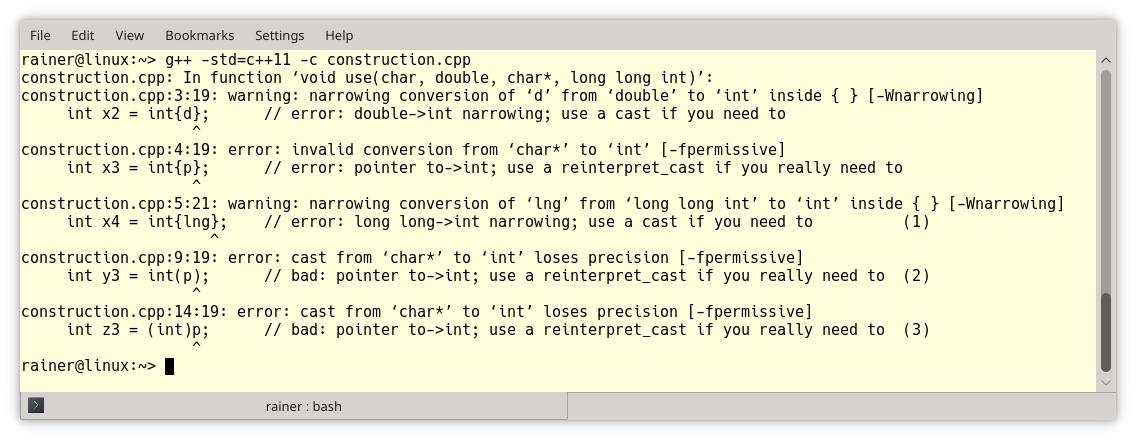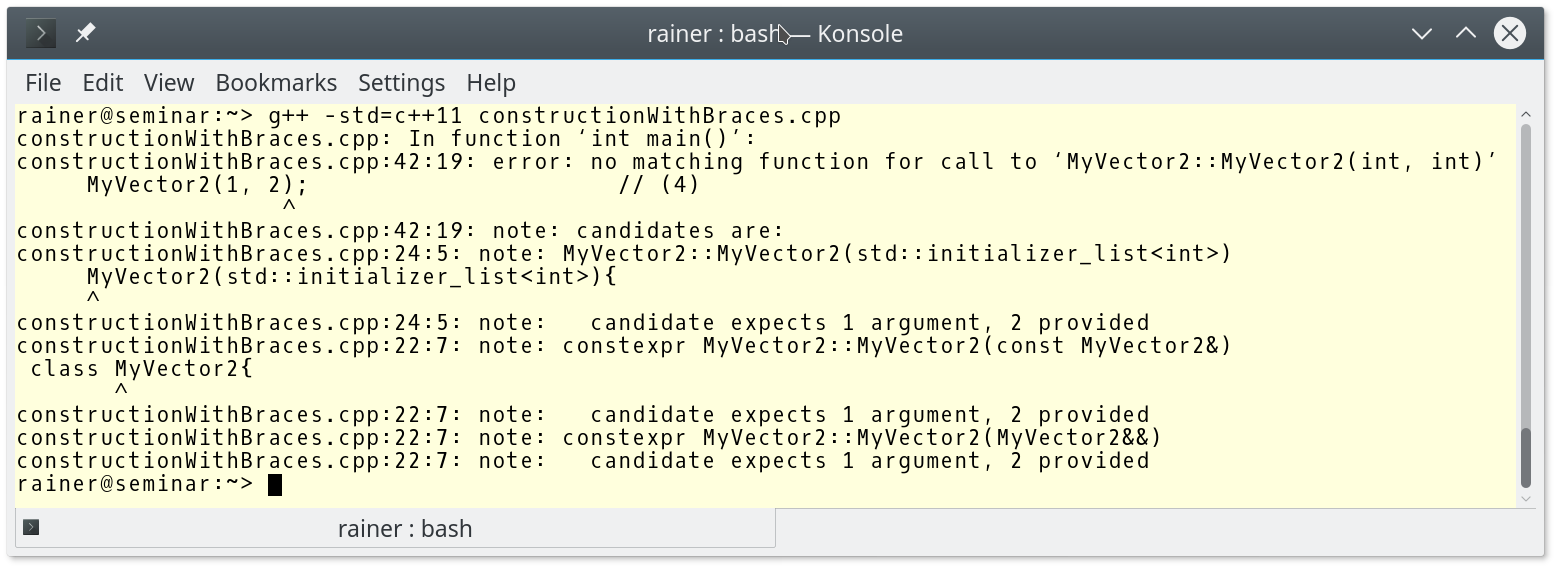C++ Core Guidelines: Rules for Statements
Before I continue with the roughly 15 rules for statements, let me finish the two rules for expressions. Both rules help you to protect your program from undefined behavior.

Here are the two remaining rules for expressions.
ES.64: Use the T{e}notation for construction
The reason for using T{e} to construct a value is quite apparent. In contrast to T(e) or (T)e, T{e} does not allow narrowing conversion. Narrowing conversion is a conversion including the loss of data accuracy. I assume this is, most of the time, not your intention. Have a look at the example from the guidelines.
void use(char ch, double d, char* p, long long lng){ int x1 = int{ch}; // OK, but redundant int x2 = int{d}; // error: double->int narrowing; use a cast if you need to int x3 = int{p}; // error: pointer to->int; use a reinterpret_cast if you really need to int x4 = int{lng}; // error: long long->int narrowing; use a cast if you need to (1) int y1 = int(ch); // OK, but redundant int y2 = int(d); // bad: double->int narrowing; use a cast if you need to int y3 = int(p); // bad: pointer to->int; use a reinterpret_cast if you really need to (2) int y4 = int(lng); // bad: long->int narrowing; use a cast if you need to int z1 = (int)ch; // OK, but redundant int z2 = (int)d; // bad: double->int narrowing; use a cast if you need to int z3 = (int)p; // bad: pointer to->int; use a reinterpret_cast if you really need to (3) int z4 = (int)lng; // bad: long long->int narrowing; use a cast if you need to }
Here is what Gcc provides without any special flags.

If you carefully read the output of the compiler run, you will observe a few interesting facts.
 Modernes C++ Mentoring
Modernes C++ Mentoring
Do you want to stay informed: Subscribe.
- Expression (1) will only give a warning in the first code block; the two previous expressions will produce an error.
- Only the expressions (2) and (3) result in an error. The other conversions in the second and third code block will not even give a warning.
You must keep a particular rule in mind if you construct a value with T(e1, e2) or T{e1, e2}. What will happen if you have a class that has two competing constructors? One constructor accepting two ints (MyVector(int, int)) and the other accepting an std::initializer_list<int> (MyVector(std::initializer_list<int>))? The interesting question is: Does a call MyVector(1, 2) or a call MyVector{int, int} the constructor for two ints or the one with the std::initalizer_list<int>?
// constructionWithBraces.cpp #include <iostream> class MyVector{ public: MyVector(int, int){ std::cout << "MyVector(int, int)" << std::endl; } MyVector(std::initializer_list<int>){ std::cout << "MyVector(std::initalizer_list<int>)" << std::endl; } }; class MyVector1{ public: MyVector1(int, int){ std::cout << "MyVector1(int, int)" << std::endl; } }; class MyVector2{ public: MyVector2(int, int){ std::cout << "MyVector2(int, int)" << std::endl; } }; int main(){ std::cout << std::endl; MyVector(1, 2); // (1) MyVector{1, 2}; // (2) std::cout << std::endl; MyVector1{1, 2}; // (3) std::cout << std::endl; MyVector2(1, 2); // (4) std::cout << std::endl; }
Here is the output of the program. The call (1) calls the constructor with two ints; the call (2) the constructor with the std::initializer_list<int>. If you invoke MyVector1{1, 2} (3), der constructor MyVector1(1, 2) is a kind of fallback.
They will not hold for (4). In this case, the constructor with the std::initializer_list<int> is not the fallback.

A constructor taking a std::initializer_list as an argument is often called a sequence constructor.
Do you know why I called the class in the example MyVector? The reason is that the two following expressions behave differently.
std::vector<int> vec(10, 1); // ten elements with 1 std::vector<int> vec2{10, 1}; // two elements 10 and 1
The first line creates a vector of 10 elements with the value 1; the second line will create a vector with the values 10 and 1.
ES.65: Don’t dereference an invalid pointer
Let me put it this way. If you dereference an invalid pointer, such as a nullptr, your program has undefined behavior. This is nasty. The only way to avoid this is to check your pointer before its usage.
void func(int* p) { if (p == nullptr) { // do something special } int x = *p; ... }
How can you overcome this issue? Don’t use a naked pointer. Use a smart pointer such as std::unique_ptr or std::shared_ptr or a reference. I have already written a post on the different kinds of ownership semantics in modern C++. Read the details here: C++ Core Guidelines: Rules to Resource Management.
Let’s switch gears.
Rule for statements
The statement rules are pretty obvious; therefore, I can make it short.
- It will help if you prefer a switch statement to an if statement when there is a choice (ES.70) because a switch statement may be more readable and can be better optimized.
- The same holds for a range-based for-loop (ES.71) compared to a for-loop. First, a range-based for loop is easier to read, and second, you can not make an index error or change the index while looping.
- When you have an obvious loop variable, you should use a for-loop instead of a while statement (ES.72); if not, you should use a while statement (ES.73).
(1) shows an example of when you should prefer a for loop and (2) when you should prefer a while statement.
for (gsl::index i = 0; i < vec.size(); i++) { // (1) // do work } int events = 0; // (2) while (wait_for_event()) { ++events; // ... }
- You should declare a loop variable in a for-loop (ES.74). This will hold for a for-loop and since C++17 for an if– or switch-statement. Read the details here: C++17 – What’s new in the core language?
- Avoid do-statements (ES.75) and goto-statements (ES.76), and minimize the use of break and continue in loops (ES.77) because they are difficult to read. If something is difficult to read, it’s also error-prone.
What’s next?
There are a few rules for statements left. My next post will start with them. Afterward, the arithmetic rules become more thrilling.
Thanks a lot to my Patreon Supporters: Matt Braun, Roman Postanciuc, Tobias Zindl, G Prvulovic, Reinhold Dröge, Abernitzke, Frank Grimm, Sakib, Broeserl, António Pina, Sergey Agafyin, Андрей Бурмистров, Jake, GS, Lawton Shoemake, Jozo Leko, John Breland, Venkat Nandam, Jose Francisco, Douglas Tinkham, Kuchlong Kuchlong, Robert Blanch, Truels Wissneth, Mario Luoni, Friedrich Huber, lennonli, Pramod Tikare Muralidhara, Peter Ware, Daniel Hufschläger, Alessandro Pezzato, Bob Perry, Satish Vangipuram, Andi Ireland, Richard Ohnemus, Michael Dunsky, Leo Goodstadt, John Wiederhirn, Yacob Cohen-Arazi, Florian Tischler, Robin Furness, Michael Young, Holger Detering, Bernd Mühlhaus, Stephen Kelley, Kyle Dean, Tusar Palauri, Juan Dent, George Liao, Daniel Ceperley, Jon T Hess, Stephen Totten, Wolfgang Fütterer, Matthias Grün, Ben Atakora, Ann Shatoff, Rob North, Bhavith C Achar, Marco Parri Empoli, Philipp Lenk, Charles-Jianye Chen, Keith Jeffery, Matt Godbolt, Honey Sukesan, bruce_lee_wayne, Silviu Ardelean, schnapper79, Seeker, and Sundareswaran Senthilvel.
Thanks, in particular, to Jon Hess, Lakshman, Christian Wittenhorst, Sherhy Pyton, Dendi Suhubdy, Sudhakar Belagurusamy, Richard Sargeant, Rusty Fleming, John Nebel, Mipko, Alicja Kaminska, Slavko Radman, and David Poole.
| My special thanks to Embarcadero |  |
| My special thanks to PVS-Studio |  |
| My special thanks to Tipi.build |  |
| My special thanks to Take Up Code |  |
| My special thanks to SHAVEDYAKS |  |
Modernes C++ GmbH
Modernes C++ Mentoring (English)
Rainer Grimm
Yalovastraße 20
72108 Rottenburg
Mail: schulung@ModernesCpp.de
Mentoring: www.ModernesCpp.org




Leave a Reply
Want to join the discussion?Feel free to contribute!